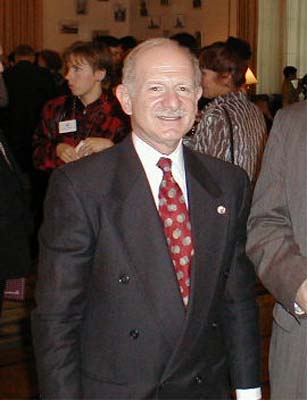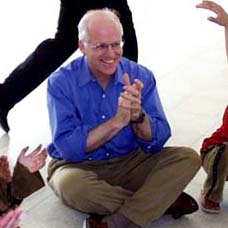2006.09.26: September 26, 2006: Headlines: COS - Afghanistan: Directors - Schneider: VOA News: Mark Schneider is senior vice president at the I.C.G. and an expert on post-conflict reconstruction in Afghanistan
Peace Corps Online:
Peace Corps News:
Directors of the Peace Corps:
Mark Schneider:
January 23, 2005: Index: PCOL Exclusive: Peace Corps Directors - Schneider :
2006.09.26: September 26, 2006: Headlines: COS - Afghanistan: Directors - Schneider: VOA News: Mark Schneider is senior vice president at the I.C.G. and an expert on post-conflict reconstruction in Afghanistan
Mark Schneider is senior vice president at the I.C.G. and an expert on post-conflict reconstruction in Afghanistan

I.C.G.'s Schneider points to specific reforms in four major areas. "If you look at any post-conflict situation you really talk about security. You look at an effort to establish a functioning and effective government. You talk about restarting an economy that can be sustaining. And you talk about rule of law." Schneider says several things stand in the way of those needed reforms. Corruption -- both within and outside the government; the continued presence of armed militias; and the legions of insurgents intent on reversing the country's newfound freedoms. Mark Schneider, Senior Vice President of the International Crisis Group in Washington, was the second Returned Peace Corps Volunteer (El Salvador, 1966–68) to head the agency.
Mark Schneider is senior vice president at the I.C.G. and an expert on post-conflict reconstruction in Afghanistan
Dispute Over Reform Agenda for Afghanistan
By George Dwyer
Washington, DC
26 September 2006
The Washington D.C.-based International Crisis Group works to resolve violent struggle around the world and help regions recover afterward. It dispatches highly trained conflict analysts to the scene and designs practical conflict resolution strategies based on their findings. But as VOA's George Dwyer reports, not everyone is supportive of the reforms the group has proposed.
After the chaos of war comes the arduous task of rebuilding a nation in ruins. In the case of Afghanistan, a Washington-based group called the I.C.G. -- International Crisis Group -- has been assisting with technical expertise on post-conflict reconstruction.
Mark Schneider is senior vice president at the I.C.G. and an expert on post-conflict reconstruction in Afghanistan. He says the ultimate goal is to seek, build and sustain peace. "We hope what we contribute to is a peace-building process in which -- in a post-conflict situation -- the institutions are built that sustain peace.
Everybody agrees that it is essential to help Afghanistan recover, establish a functioning state, establish a government that responds to the needs of the people, begin to deal with the underlying problems of poverty."
But not everyone agrees about how that should be done. Some believe the success of the Afghan insurgency is due to the support it receives from native Afghans. Many Afghans believe outsiders should not be imposing fundamental reforms on their society. Some poppy farmers -- and the heroin dealers they supply -- reject the I.C.G.'s suggestion that they stop growing and trading that crop.
Author and cleric Mohammad Ayaz has studied the problem. "Those people (the multinational forces) who are in Afghanistan who want to have a good relationship with Afghanistan, and want to help Afghanistan, and want to help with the reconstruction of Afghanistan, they must understand that the Afghan nation wants something else."
Ayaz says Afghans want to maintain age-old customs. And many Afghans are particularly concerned about how western style reforms might undermine their religious traditions. "The Afghan nation is a Muslim nation. Islam is actually mixed in the blood of Afghans. The associations, and N.G.O.s (non-governmental organizations) and international forces in Afghanistan, if these people are here to convert the Afghans to other religions, if they are here to support these things then they don't have any place in Afghanistan. They must go."
I.C.G. says it has no religious agenda and no political axe to grind.
It claims its reform proposals are based on past successes. I.C.G. is proposing a sustained financial and political commitment to Afghanistan from both the international community and the Afghan government.
I.C.G.'s Schneider points to specific reforms in four major areas. "If you look at any post-conflict situation you really talk about security. You look at an effort to establish a functioning and effective government. You talk about restarting an economy that can be sustaining. And you talk about rule of law."
Schneider says several things stand in the way of those needed reforms. Corruption -- both within and outside the government; the continued presence of armed militias; and the legions of insurgents intent on reversing the country's newfound freedoms.
"We have urged that the degree of local government and local community structures be strengthened," says Schneider. "And we have urged strongly that as part of the effort to establish new police forces and new judicial systems that it is essential to get rid of corrupt officials. Those kinds of policy recommendations, we are convinced, if adopted, would go a long way to reducing the threat of conflict, and reducing the insurgency's capability to maintain itself."
But successfully negotiating long-standing religious and cultural conflicts is a tremendous challenge for reconstruction policy planners. If that can be achieved, clearing away the rubble is often relatively easy.
When this story was posted in October 2006, this was on the front page of PCOL:





Peace Corps Online The Independent News Forum serving Returned Peace Corps Volunteers
 | Chris Dodd's Vision for the Peace Corps
Senator Chris Dodd (RPCV Dominican Republic) spoke at the ceremony for this year's Shriver Award and elaborated on issues he raised at Ron Tschetter's hearings. Dodd plans to introduce legislation that may include: setting aside a portion of Peace Corps' budget as seed money for demonstration projects and third goal activities (after adjusting the annual budget upward to accommodate the added expense), more volunteer input into Peace Corps operations, removing medical, healthcare and tax impediments that discourage older volunteers, providing more transparency in the medical screening and appeals process, a more comprehensive health safety net for recently-returned volunteers, and authorizing volunteers to accept, under certain circumstances, private donations to support their development projects. He plans to circulate draft legislation for review to members of the Peace Corps community and welcomes RPCV comments. |
 | He served with honor
One year ago, Staff Sgt. Robert J. Paul (RPCV Kenya) carried on an ongoing dialog on this website on the military and the peace corps and his role as a member of a Civil Affairs Team in Iraq and Afghanistan. We have just received a report that Sargeant Paul has been killed by a car bomb in Kabul. Words cannot express our feeling of loss for this tremendous injury to the entire RPCV community. Most of us didn't know him personally but we knew him from his words. Our thoughts go out to his family and friends. He was one of ours and he served with honor. |
 | Chris Shays Shifts to Favor an Iraq Timetable
In a policy shift, RPCV Congressman Chris Shays, long a staunch advocate of the Bush administration's position in Iraq, is now proposing a timetable for a withdrawal of American troops. How Mr. Shays came to this change of heart is, he says, a matter of a newfound substantive belief that Iraqis need to be prodded into taking greater control of their own destiny under the country’s newly formed government. As Chairman of the House Government Reform subcommittee on national security, he plans to draft a timetable for a phased withdrawal and then push for its adoption. A conscientious objector during the Vietnam War who said that if drafted he would not serve, Chris Shays has made 14 trips to Iraq and was the first Congressman to enter the country after the war - against the wishes of the Department of Defense. |
 | Peace Corps' Screening and Medical Clearance
The purpose of Peace Corps' screening and medical clearance process is to ensure safe accommodation for applicants and minimize undue risk exposure for volunteers to allow PCVS to complete their service without compromising their entry health status. To further these goals, PCOL has obtained a copy of the Peace Corps Screening Guidelines Manual through the Freedom of Information Act (FOIA) and has posted it in the "Peace Corps Library." Applicants and Medical Professionals (especially those who have already served as volunteers) are urged to review the guidelines and leave their comments and suggestions. Then read the story of one RPCV's journey through medical screening and his suggestions for changes to the process. |
 | The Peace Corps is "fashionable" again
The LA Times says that "the Peace Corps is booming again and "It's hard to know exactly what's behind the resurgence." PCOL Comment: Since the founding of the Peace Corps 45 years ago, Americans have answered Kennedy's call: "Ask not what your country can do for you--ask what you can do for your country. My fellow citizens of the world: ask not what America will do for you, but what together we can do for the freedom of man." Over 182,000 have served. Another 200,000 have applied and been unable to serve because of lack of Congressional funding. The Peace Corps has never gone out of fashion. It's Congress that hasn't been keeping pace. |
 | PCOL readership increases 100%
Monthly readership on "Peace Corps Online" has increased in the past twelve months to 350,000 visitors - over eleven thousand every day - a 100% increase since this time last year. Thanks again, RPCVs and Friends of the Peace Corps, for making PCOL your source of information for the Peace Corps community. And thanks for supporting the Peace Corps Library and History of the Peace Corps. Stay tuned, the best is yet to come. |
 | History of the Peace Corps
PCOL is proud to announce that Phase One of the "History of the Peace Corps" is now available online. This installment includes over 5,000 pages of primary source documents from the archives of the Peace Corps including every issue of "Peace Corps News," "Peace Corps Times," "Peace Corps Volunteer," "Action Update," and every annual report of the Peace Corps to Congress since 1961. "Ask Not" is an ongoing project. Read how you can help. |
Read the stories and leave your comments.

Some postings on Peace Corps Online are provided to the individual members of this group without permission of the copyright owner for the non-profit purposes of criticism, comment, education, scholarship, and research under the "Fair Use" provisions of U.S. Government copyright laws and they may not be distributed further without permission of the copyright owner. Peace Corps Online does not vouch for the accuracy of the content of the postings, which is the sole responsibility of the copyright holder.
Story Source: VOA News
This story has been posted in the following forums: : Headlines; COS - Afghanistan; Directors - Schneider
PCOL34620
15

















